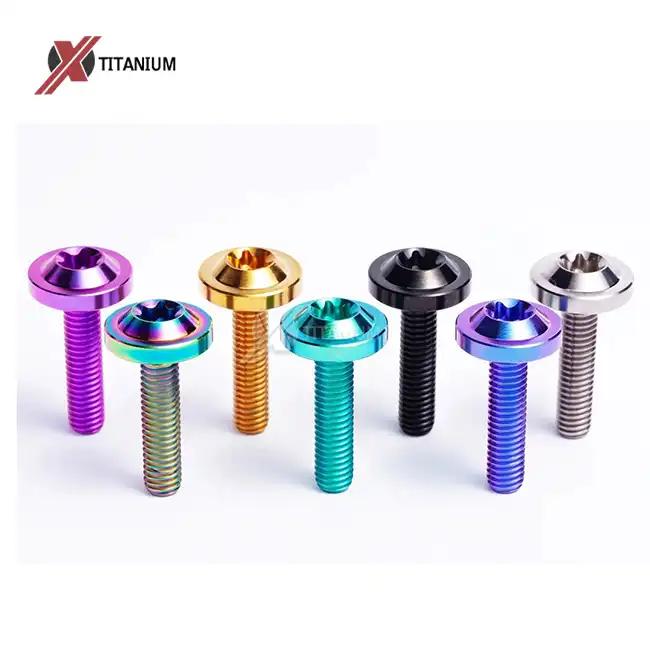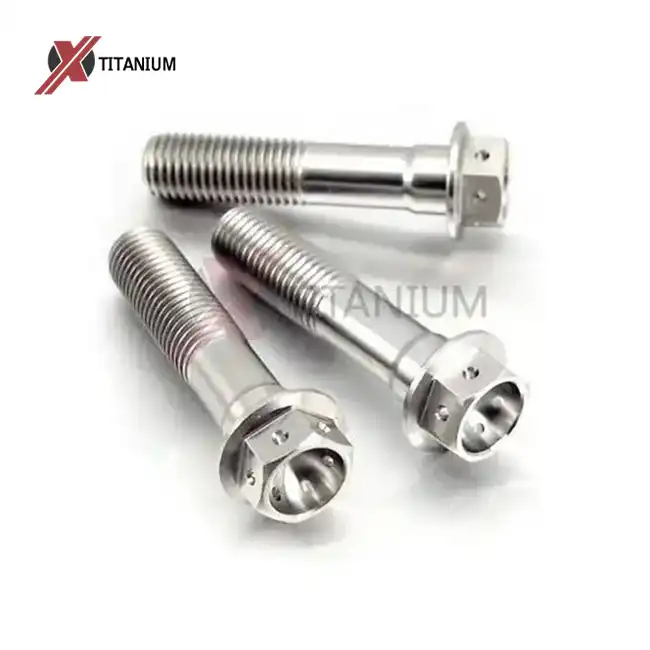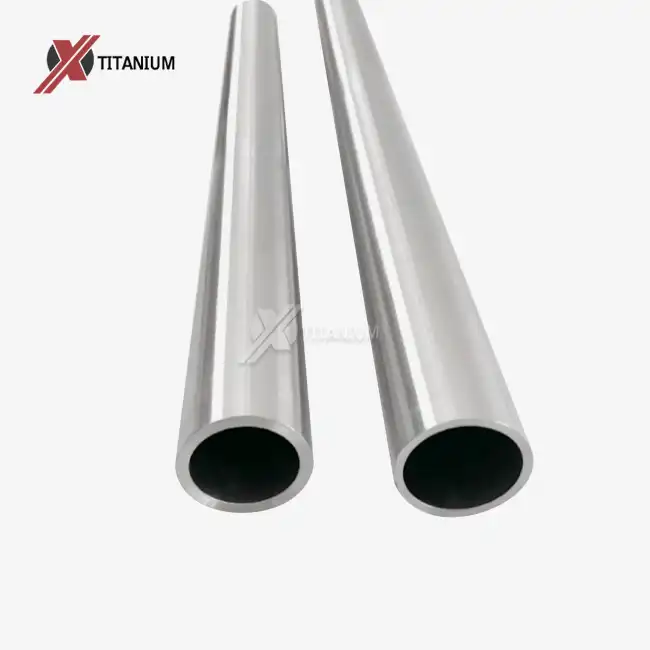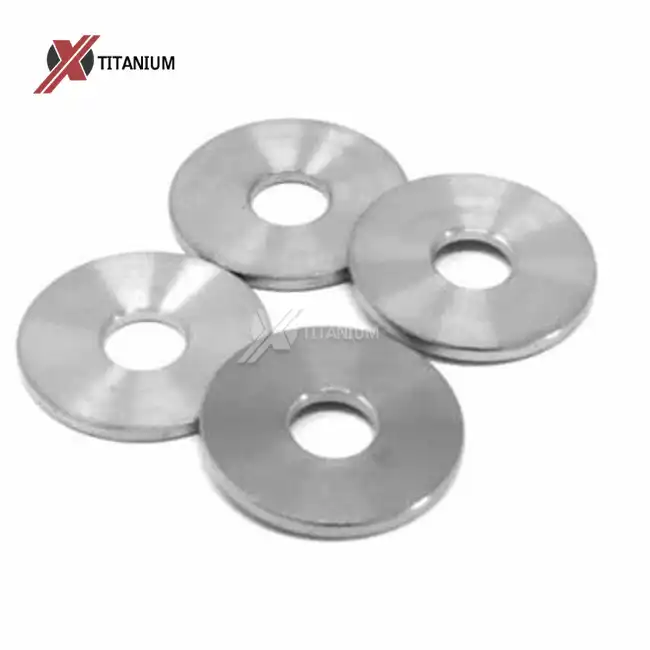When selecting the optimal fastening solutions for high-temperature engine applications, titanium alloy bolts emerge as the superior choice for aerospace, automotive, and industrial sectors. These specialized fasteners combine exceptional heat resistance with remarkable strength-to-weight ratios, making them indispensable for engines operating under extreme thermal conditions. The unique metallurgical properties of titanium alloys enable these bolts to maintain structural integrity at temperatures exceeding 600°C while resisting oxidation and thermal expansion challenges that plague conventional steel fasteners.
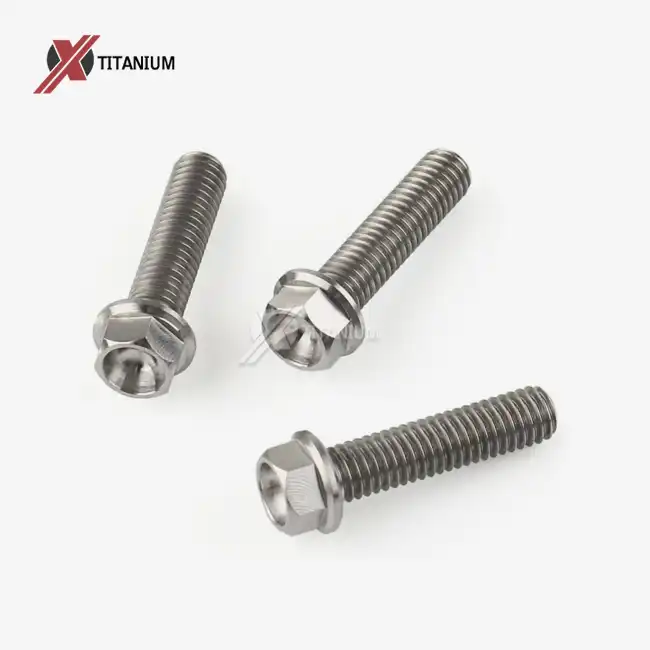
Why High-Temperature Engine Applications Demand Premium Fastening Solutions?
Modern high-performance engines operate in increasingly demanding environments where conventional fasteners simply cannot perform. The aerospace industry has pioneered the use of advanced materials for engine components, recognizing that every gram of weight reduction translates to improved fuel efficiency and enhanced performance. Titanium alloy bolts address multiple critical challenges simultaneously: they withstand extreme temperatures without degradation, resist corrosion from combustion byproducts, and maintain their mechanical properties under cyclic loading conditions.
Engine manufacturers face stringent requirements for component reliability, particularly in applications where failure consequences are catastrophic. The automotive racing sector, aerospace propulsion systems, and industrial gas turbines all depend on fastening solutions that can endure temperature fluctuations, vibration, and chemical exposure. Traditional steel bolts often experience metal fatigue, stress corrosion cracking, and thermal expansion issues that compromise joint integrity over time.
Selection Criteria for Evaluating Premium Engine Fasteners
Our evaluation process considers multiple factors essential to high-temperature engine applications. Material composition takes precedence, with Grade 5 (Ti-6Al-4V) titanium alloy demonstrating optimal balance between strength, ductility, and thermal stability. We assess heat resistance capabilities, examining how fasteners perform at sustained temperatures above 500°C without losing tensile strength or experiencing microstructural changes.
Corrosion resistance evaluation focuses on performance in acidic combustion environments, salt spray exposure, and chemical compatibility with engine fluids. Manufacturing precision receives scrutiny through dimensional accuracy assessments, surface finish quality, and thread consistency measurements. Load-bearing capacity testing includes both static and dynamic loading scenarios, simulating real-world engine operation conditions.
Surface treatment options significantly impact performance longevity. We evaluate anodizing effectiveness, nitriding benefits, and polishing quality to determine optimal protection against environmental degradation. Customer feedback from aerospace manufacturers, racing teams, and industrial equipment operators provides real-world validation of theoretical performance claims.
Top 5 Titanium Alloy Bolts for High-Temperature Engine Applications
Grade 5 Hex Head Cap Screws with Anodized Finish
These precision-engineered fasteners represent the gold standard for high-temperature engine applications. Manufactured from Ti-6Al-4V alloy, they deliver exceptional strength-to-weight ratios while maintaining dimensional stability across temperature ranges from -200°C to +600°C. The anodized surface treatment provides enhanced corrosion resistance and wear protection, extending service life in harsh engine environments.
Key advantages include superior fatigue resistance under cyclic loading, non-magnetic properties essential for sensitive electronic systems, and biocompatibility for applications requiring FDA compliance. The hex head design facilitates precise torque application and removal, while the fully threaded configuration ensures maximum engagement with mating components. These bolts demonstrate remarkable oxidation resistance, preventing degradation even when exposed to oxygen-rich combustion environments.
Manufacturing processes incorporate advanced quality control measures, including ultrasonic testing for internal defects and dimensional verification using coordinate measuring machines. The alloy composition provides optimal balance between alpha and beta phases, resulting in enhanced mechanical properties and improved machinability. Surface roughness specifications meet aerospace standards, ensuring consistent performance and appearance.
Temperature resistance capabilities extend beyond typical engine operating ranges, making these fasteners suitable for experimental propulsion systems and advanced turbine applications. The lightweight characteristics contribute to overall engine weight reduction, improving power-to-weight ratios and fuel efficiency. Installation requires standard tools, but proper torque specifications must be followed to prevent galling or thread damage.
Socket Head Cap Screws with Polished Surface Treatment
Engineered for applications requiring flush mounting and high aesthetic standards, these socket head cap screws combine functional excellence with visual appeal. The polished surface treatment reduces friction coefficients and enhances cleanability, making them ideal for food-grade applications and medical device manufacturing. Grade 5 titanium alloy bolts composition ensures reliable performance under thermal cycling conditions.
The socket head design enables installation in confined spaces where traditional hex heads cannot fit. This configuration proves particularly valuable in compact engine designs where space constraints limit access to fastening points. The polished finish eliminates surface irregularities that could serve as stress concentration points, improving fatigue life under dynamic loading conditions.
Precision threading meets international standards for dimensional accuracy and surface finish. The manufacturing process incorporates cold heading techniques that enhance grain structure and improve mechanical properties. Heat treatment procedures optimize the microstructure for maximum strength and ductility, while maintaining excellent machinability characteristics.
These fasteners excel in applications requiring frequent disassembly and reassembly, as the polished surface resists galling and thread seizure. The smooth finish facilitates cleaning and inspection procedures, supporting maintenance protocols in critical applications. Corrosion resistance surpasses stainless steel alternatives while providing significant weight savings compared to traditional materials.
Button Head Socket Screws with Rainbow Anodizing
These innovative fasteners combine functional excellence with distinctive visual identification capabilities. The rainbow anodizing process creates interference patterns that not only provide enhanced corrosion protection but also enable easy component identification during assembly and maintenance procedures. The button head profile distributes clamping loads over larger areas, reducing stress concentrations in composite materials.
The unique coloring system proves invaluable in complex assemblies where different bolt grades or torque specifications must be distinguished visually. Racing applications particularly benefit from this feature, as pit crews can quickly identify specific fasteners during rapid maintenance procedures. The anodizing process penetrates the titanium surface, creating a durable oxide layer that resists wear and chemical attack.
Manufacturing precision ensures consistent head geometry and thread characteristics across production batches. The button head design provides smooth profiles that minimize aerodynamic disruption in external applications. Socket drive systems accommodate standard hex keys while providing adequate torque transmission capabilities for high-strength installations.
Temperature stability extends across extreme ranges without color degradation or surface deterioration. The anodized layer maintains its protective properties even when subjected to thermal cycling between ambient and operating temperatures. These fasteners demonstrate excellent performance in marine environments where salt spray exposure would rapidly degrade conventional materials.
Flanged Hex Bolts with Nitrided Surface Enhancement
Designed for applications requiring integrated washer functionality, these flanged hex bolts eliminate the need for separate sealing components while providing enhanced load distribution. The nitriding surface treatment creates an extremely hard outer layer that resists abrasion and improves fatigue characteristics. This process increases surface hardness without compromising the underlying material's ductility.
The integrated flange design reduces assembly time and eliminates the possibility of missing or incorrectly installed washers. This feature proves particularly valuable in high-volume manufacturing environments where assembly efficiency directly impacts production costs. The hex head configuration accommodates standard tools while providing excellent torque transmission capabilities.
Nitriding treatment penetrates approximately 0.1mm into the titanium surface, creating a gradient hardness profile that transitions smoothly to the base material. This process enhances wear resistance without introducing brittleness or stress concentrations. The treated surface demonstrates remarkable resistance to fretting corrosion and contact fatigue.
These fasteners excel in applications involving frequent vibration or thermal cycling, as the nitrided surface resists micro-welding and galling phenomena. The enhanced surface hardness prevents thread damage during installation and removal procedures. Manufacturing quality control includes surface hardness verification and dimensional inspection to ensure consistent performance characteristics.
Custom Threaded Rods with Multi-Color Anodizing Options
Engineered for specialized applications requiring non-standard configurations, these custom threaded rods provide maximum flexibility in fastening solutions. Available in various color options including blue, green, purple, black, and natural titanium alloy bolts finish, they enable system designers to implement color-coding schemes for different applications or torque specifications. The continuous threading allows precise adjustment and positioning capabilities.
Manufacturing capabilities include custom lengths, thread pitches, and diameter specifications to meet unique application requirements. The anodizing process can be applied selectively to create multi-colored sections for enhanced visual identification. This flexibility proves essential in prototype development and limited-production applications where standard fasteners cannot meet specific requirements.
Quality control procedures include thread gauge verification, dimensional inspection, and surface treatment consistency evaluation. The custom manufacturing process maintains the same material properties and performance characteristics as standard fasteners while accommodating unique geometric requirements. Lead times for custom products typically range from 2-4 weeks depending on complexity and quantity.
These fasteners demonstrate exceptional performance in research and development applications where standard configurations prove inadequate. The ability to specify exact dimensions and surface treatments enables optimization for specific operating conditions. Custom threading options include metric, imperial, and specialty pitches to accommodate international standards and legacy systems.
Global Market Characteristics and Regulatory Considerations
The international titanium fastener market operates under stringent regulatory frameworks that vary by region and application sector. European aerospace manufacturers must comply with EASA certification requirements, while North American producers follow FAA and NADCAP standards. Asian markets emphasize cost-effectiveness while maintaining quality standards comparable to Western specifications.
Regional preferences influence material specifications and testing requirements. Japanese manufacturers often specify tighter dimensional tolerances, while German customers prioritize comprehensive material certification documentation. Understanding these cultural and regulatory differences enables suppliers to tailor their offerings appropriately for different markets.
Supply chain considerations include raw material sourcing, manufacturing capabilities, and quality certification requirements. The global nature of titanium mining and processing requires careful attention to traceability and conflict mineral compliance. International shipping regulations for aerospace materials add complexity to logistics planning and documentation requirements.
Purchasing Recommendations and Critical Considerations
When selecting titanium alloy bolts for high-temperature engine applications, prioritize material certification and traceability documentation. Verify that suppliers maintain appropriate quality certifications such as AS9100 for aerospace applications or ISO 13485 for medical devices. Request material test reports that include chemical composition, mechanical properties, and heat treatment verification.
Consider total cost of ownership rather than initial purchase price alone. Premium titanium fasteners typically provide extended service life, reduced maintenance requirements, and improved system reliability that justify higher upfront costs. Evaluate supplier technical support capabilities, as complex applications often require engineering consultation and application-specific recommendations.
Inventory management strategies should account for long lead times and potential supply disruptions. Many manufacturers maintain safety stock levels for critical fasteners while implementing vendor-managed inventory programs for routine applications. Consider establishing relationships with multiple qualified suppliers to ensure supply continuity.
Conclusion
Selecting the optimal titanium alloy bolts for high-temperature engine applications requires careful consideration of material properties, manufacturing quality, and application-specific requirements. The five fastener types evaluated demonstrate varying advantages for different operational scenarios, from aerospace propulsion systems to industrial turbine applications. Grade 5 titanium alloy consistently delivers the best balance of strength, temperature resistance, and corrosion protection for demanding engine environments. Investment in premium fastening solutions yields long-term benefits through improved reliability, reduced maintenance costs, and enhanced system performance that justify the initial material costs.
Frequently Asked Questions
Q1: What temperature range can titanium alloy bolts withstand in engine applications?
A: Grade 5 titanium alloy bolts maintain their mechanical properties at temperatures up to 600°C (1112°F) continuously, with short-term exposure capabilities extending to 800°C. The material's excellent thermal stability and low thermal expansion coefficient make them ideal for high-temperature engine environments where conventional steel fasteners would fail.
Q2: How do titanium alloy bolts compare to stainless steel for engine applications?
A: Titanium alloy bolts offer superior strength-to-weight ratios, better corrosion resistance, and enhanced temperature stability compared to stainless steel alternatives. While initial costs are higher, titanium fasteners provide longer service life, reduced maintenance requirements, and significant weight savings that improve overall engine performance and fuel efficiency.
Q3: What surface treatments are most effective for high-temperature engine fasteners?
A: Anodizing and nitriding represent the most effective surface treatments for high-temperature applications. Anodizing provides excellent corrosion resistance and visual identification capabilities, while nitriding creates an extremely hard surface layer that resists wear and fretting. Both treatments maintain their protective properties at elevated temperatures without degrading the underlying material properties.
Partner with Chuanglian for Premium Titanium Alloy Bolts Manufacturing Solutions
Baoji Chuanglian New Metal Material Co., Ltd. stands as your trusted titanium alloy bolts supplier, offering comprehensive fastening solutions for high-temperature engine applications. Our decade of specialized experience in titanium processing, combined with advanced CNC machining capabilities and strict quality control systems, ensures every fastener meets the demanding requirements of aerospace, automotive, and industrial customers.
Located in Baoji City, renowned as the "City of Titanium," we maintain direct access to premium raw materials and specialized manufacturing expertise. Our comprehensive testing capabilities include material certification, dimensional verification, and performance validation to ensure consistent quality across production batches. We offer customized solutions including specific dimensions, surface treatments, and alloy compositions tailored to your unique application requirements.
Ready to enhance your engine performance with premium titanium fastening solutions? Our technical team provides expert consultation on material selection, application optimization, and integration strategies. Contact us at info@cltifastener.com or djy6580@aliyun.com to discuss your specific requirements and receive detailed technical specifications for our complete range of high-temperature engine fasteners.
References
1. Boyer, R. R. "An Overview on the Use of Titanium in the Aerospace Industry." Materials Science and Engineering: A, vol. 213, no. 1-2, 1996, pp. 103-114.
2. Lutjering, Gerd, and James C. Williams. "Titanium: Engineering Materials and Processes." 2nd ed., Springer-Verlag Berlin Heidelberg, 2007.
3. Donachie, Matthew J. "Titanium: A Technical Guide." 2nd ed., ASM International, 2000.
4. Peters, M., et al. "Titanium Alloys for Aerospace Applications." Advanced Engineering Materials, vol. 5, no. 6, 2003, pp. 419-427.
5. Banerjee, Dipankar, and John C. Williams. "Perspectives on Titanium Science and Technology." Acta Materialia, vol. 61, no. 3, 2013, pp. 844-879.
6. Rack, H. J., and J. I. Qazi. "Titanium Alloys for Biomedical Applications." Materials Science and Engineering: C, vol. 26, no. 8, 2006, pp. 1269-1277.
